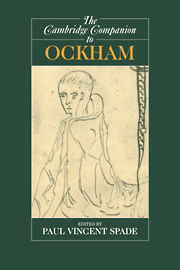Book contents
- Frontmatter
- Introduction
- 1 The Academic and Intellectual Worlds of Ockham
- 2 Some Aspects of Ockham's Logic
- 3 Semantics and Mental Language
- 4 Is There Synonymy in Ockham's Mental Language?
- 5 Ockhams' Nominalist Metaphysics
- 6 Ockham's Semantics and Ontology of the Categories
- 7 Ockham's Philosophy of Nature
- 8 The Mechanisms of Cognition
- 9 Ockham's Misunderstood Theory of Intuitive and Abstractive Cognition
- 10 Ockham's Ethical Theory
- 11 Ockham on Will, Nature, and Morality
- 12 Natural Law and Moral Omnipotence
- 13 The Political Writings
- 14 Ockham on Faith and Reason
- 15 Ockham's Repudiation of Pelagianism
- Bibliography
- Citations
- Index
6 - Ockham's Semantics and Ontology of the Categories
Published online by Cambridge University Press: 28 May 2006
- Frontmatter
- Introduction
- 1 The Academic and Intellectual Worlds of Ockham
- 2 Some Aspects of Ockham's Logic
- 3 Semantics and Mental Language
- 4 Is There Synonymy in Ockham's Mental Language?
- 5 Ockhams' Nominalist Metaphysics
- 6 Ockham's Semantics and Ontology of the Categories
- 7 Ockham's Philosophy of Nature
- 8 The Mechanisms of Cognition
- 9 Ockham's Misunderstood Theory of Intuitive and Abstractive Cognition
- 10 Ockham's Ethical Theory
- 11 Ockham on Will, Nature, and Morality
- 12 Natural Law and Moral Omnipotence
- 13 The Political Writings
- 14 Ockham on Faith and Reason
- 15 Ockham's Repudiation of Pelagianism
- Bibliography
- Citations
- Index
Summary
Ockham's treatment of the ten Aristotelian categories plays a crucial role in his innovative nominalist program. One of his main complaints against “the moderns,” as he is wont to call his opponents, is that they treat the categories as comprising ten mutually exclusive classes of distinct entities. Indeed, the unknown author of a work written against Ockham’s logic (characteristically entitled “A very useful and realist logic of Campsall the Englishman against Ockham”), writes:
To such most general genera there are subjected individuals that are really distinct from the individuals of another most general genus, [and] of which [this genus] is properly and directly predicated; for example, we can truly assert ‘This is [a] when’ pointing to the relation which is caused by the motion of the first movable in the inferior things, so that, if that individual had a distinct proper name imposed on it, one could just as truly respond to the question ‘What is it?’ by saying: ‘[A] when,’ as one can reply to the question ‘What is it?’ asked about a man, by saying: ‘A substance.’
- Type
- Chapter
- Information
- The Cambridge Companion to Ockham , pp. 118 - 142Publisher: Cambridge University PressPrint publication year: 1999
- 21
- Cited by

